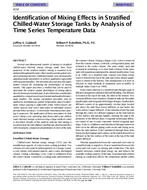
4216 — Identification of Mixing Effects in Stratified Chilled-Water Storage Tanks by Analysis of Time Series Temperature Data
- Comments Off on 4216 — Identification of Mixing Effects in Stratified Chilled-Water Storage Tanks by Analysis of Time Series Temperature Data
- ASHRAE
Several one-dimensional models of mixing in stratified chilled-water thermal energy storage tanks have been proposed. In the simplest models, mixing is assumed to be uniform throughout the tank. Other models permit spatial variation of mixing intensity. Published models were developed by adjusting model parameters to achieve qualitative agreement with measured profiles. The literature does not describe quantitative criteria for evaluating the performance of mixing models. This paper describes a method that can be used to determine the relative spatial distribution of mixing effects directly from experimental data. It also illustrates a method for quantitative comparison of experimental and modeled temperature profiles. The mixing calculation procedure may be applied to instantaneous spatial temperature data if temperature sensor spacing is sufficiently small. When sensors are widely spaced, time series data taken at individual sensors provide better accuracy. A criterion for maximum sensor spacing is proposed. The application of these procedures to time series charge-cycle operating data from a full-scale chilled-water thermal storage system serving a large medical center is described. Results of this analysis indicate that mixing is localized near the inlet diffuser and that one-dimensional flow with streamwise conduction predominates in most of the tank.
Units: Dual
Citation: ASHRAE Transactions, 1998, Vol. 104, Part 2, Toronto, ON
Product Details
- Published:
- 1998
- Number of Pages:
- 11
- File Size:
- 1 file , 200 KB
- Product Code(s):
- D-7683

